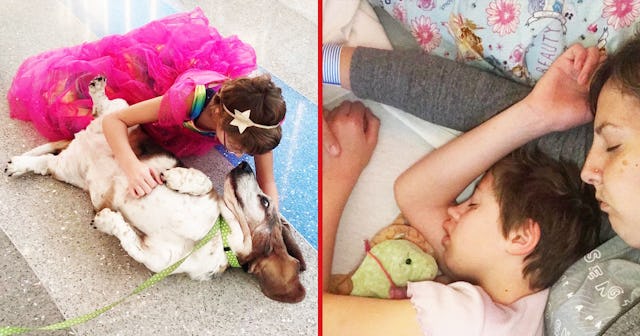One Doctor's Humanity Saved Our Little Girl

Three weeks ago, a seizure left my daughter non-responsive. Her eyes were rolled to the back of her head and no amount of sternum rubs or home rescue meds could bring her back to us. So we went to the emergency room, where they brought her out of it and let us take her home. But something was different this time. As the days went on, we noticed she was uncharacteristically tired, and she never spoke. Her words had vanished. She just wasn’t “bouncing back.”
Gracie’s got a rare autoimmune disease where her body attacks her brain, so we’ve got a high tolerance for unusual things, but this was different. We called her doctor who said, “Bring her to the ER.” We expected labs to be drawn and then to be handed discharge paperwork. Instead we were admitted.
Gracie hadn’t been able to walk since a seizure in May, and now she wasn’t talking. Her balance, coordination and body control were poor, and after a lot of tests and scans her doctors said, “We need to talk.”
Reluctantly we piled into a room that smelled like stale french fries. I took a seat at the end of the table and someone handed me a bottle of water. All of her doctors were there. From every department. But I couldn’t look at them. Instead I watched my water bottle leave sweat rings on the table. I knew we hadn’t gathered to sing Kumbaya, but I wasn’t at all prepared for the words we were going to hear.
Think Charlie Brown sound effects. “Wah… wah… wah… It’s time we focus on quality of life… wah… wah… wah.”
I knew the words I was hearing, but I couldn’t process them.
Then, when I did I rejected them. I rejected them with every fiber of my being.
I cried. I accused the doctors of giving up. I begged them to keep trying. Then… I resigned.
Courtesy of Cara Arnold
I resigned to the realization that we can’t change the situation. Her illness has changed her brain. And if the doctors who I trusted to save her life were telling me the best thing we could do was give her a good quality of life, then we needed to do it.
So I said, “Onward with rehabilitation.”
And the doctors, all five of them, set out to make it happen.
She spent 10 days more in the hospital, waiting. Waiting for insurance to authorize the help she needed.
Then the claim was reviewed. And denied. Denied? Denied how? Five physicians said it was necessary. Yet — Anthem said “no.” Her doctor apologized. Another told us, “Insurance has us by the balls. They’re playing games, and sticking you with a cash bill while they do it.” An appeal was in the works, they promised. But it would take time. Time that wasn’t on our side. They encouraged me to take her home “while things got sorted out.”
And I sobbed. I sobbed so hard I couldn’t breathe. I sobbed so hard I got lost trying to get back to the hospital where she was. And I begged to speak with the department head. If they were going to let her go home without treatment because they put money ahead of medicine, they were going to look me in the eye and tell me she wasn’t worth it. But the conversation didn’t go that way.
I was met with compassion. She looked me in the eye and said, “Here, we do what’s right for the child, regardless of reimbursement. And that’s treating her. We don’t balance bill…,” she explained. And in that moment, humanity won. We still may go bankrupt from physician fees. And outpatient therapies may break us too. But because of the heart of one doctor, insurance purchased and carried to help us won’t hurt her.
And today we’re eight days into her rehab. And I’ve heard my girl’s sweet voice, and watched her take steps. Today she has a chance. A chance that insurance would have denied her.
THIS is the reality of modern medicine. We can do amazing things. But nobody wants to pay for them. We work to insure our families, but insurance executives work to protect their bottom lines. And caregivers, who should be focused on their loved ones are instead advocating for their care.
Gracie’s been in the hospital nearly a month now. And I’m finally breathing again. But the scary reality is had I accepted their “no,” insurance would have dictated her fate, not the doctors who are trained to support her.
A mama’s persistence shouldn’t be the driving force to care. But today, it is.
Know the strength of your voice, mamas.
Until something changes it could be the difference between life and death.
This article was originally published on